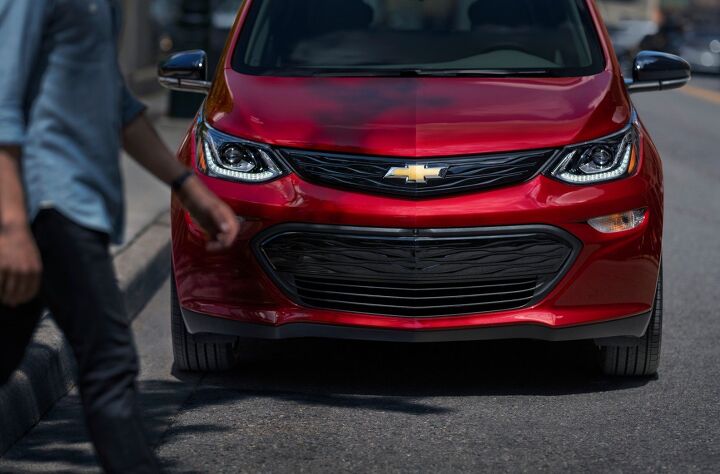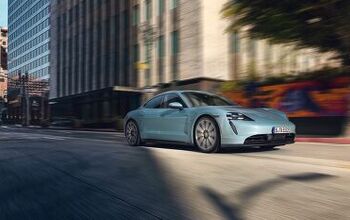Why Is Everyone So Surprised Detroit Isn't Prioritizing EVs?

News arose yesterday that General Motors’ and Ford Motor Company’s battle plans rely heavily on SUV and pickup sales, rather than electric vehicles. Details of the corporate strategies, first shared by Reuters, soon circulated through the media, with many outlets upset that the pair seem to have oversold the role electrification will play in their respective lineups through 2026. One wonders how they could possibly be this surprised.
Using data issued to parts suppliers from the two automakers, AutoForecast Solutions predicted North American production of SUV models from GM and Ford will outpace the assembly of traditional cars by more than eight to one in 2026. Roughly 93 percent of those models are expected to be dependent upon gasoline. Meanwhile, Reuters compared the manufacturers’ strategy against Tesla — a company that only exists for the explicit purpose of selling EVs and has never assembled a gas-powered automobile — as if all manufacturers are equal in scope and cater to the same type of customers.
From Reuters:
Internal production plans from other industry sources seen by Reuters support AutoForecast’s numbers, which show GM and Ford expect to produce about 320,000 pure electric vehicles — powered solely by a battery — in North America in 2026. That is nearly 10 times the 35,000 they have planned to build in 2020, but fewer than the 367,500 Tesla delivered last year.
It is only a fraction of the 5.2 million SUVs and pickups that GM and Ford expect to make in North America in 2026, according to the AutoForecast data, up 14 [percent] from 4.6 million SUVs and pickups in 2019. SUVs and pickups will account for about 87 [percent] of vehicles made by GM and Ford in the region in 2026, compared with about 82 [percent] last year.
Executives at GM and Ford told Reuters in interviews they are serious about launching more electric vehicles in the United States in the coming years, but they are concerned about getting too far ahead of mass-market demand.
None of them denied the production estimates, though.
Interestingly, Reuters published an article at exactly the same time as its piece about Detroit snubbing EVs for 2026 to highlight the large number of EVs Ford and GM plan to deliver over the next three years. Blue Oval has the Mustang Mach-E, an all-electric F-Series, Transit EV, and at least one electric model for the Lincoln brand. Meanwhile, the General wants to refresh the Chevrolet Bolt and give it a crossover cousin while it works on EV products for Cadillac, the upcoming Hummer, and several other electric models.
GM also has a new, modular electric architecture and proprietary battery tech to bestow upon its new EVs.
That shows significant commitment to electrification (development costs money), though it may also help us understand why so many outlets seem shocked. Unlike FCA, which never seemed overeager when it came to electrification, Ford and GM have been pushing the zero-emissions concept for years. Nearly every press release issued after 2015 discussed an imminent metamorphosis, where they would stop being automakers and become “mobility companies” offering self-driving vehicles, novel data-based services, and dozens of emission-free cars running on electricity. But when it comes to shades of green, the color of money always takes precedent.
The logistics simply didn’t cooperate. Autonomy turned out to be a costly, bald-faced lie as the industry began to realize it’s actually ludicrously difficult to teach a car to drive itself safely. Meanwhile, the market for EVs hasn’t matured at a pace to make them the dominant product for anyone other than Tesla. Frankly, the margins for SUVs are so good that it’s hard for us to say anything other than sticking with them seems prudent from a business standpoint — especially if the alternative is electric cars. Unfortunately, both companies (especially GM) made it sound like they had already committed themselves to total electrification.
That’s on them, even if people probably should have taken those claims with a colossal-sized grain of salt. AutoForecast admits that pursuing EVs at the expense of more profitable segments is silly.
“GM and Ford understand that buyers want more SUVs and trucks, but they’re also trying to play to Wall Street, which thinks the future is all about electric vehicles,” Sam Fiorani, vice president of global vehicle forecasting at AutoForecast, explained. “The Detroit automakers would love to get a little of that Tesla magic and money.”
So they build a few EVs in an attempt to woo investors. Tech talk is good for stock performance; manufacturing vehicles Americans actually want to buy in large volumes is good for revenue. And it helps the automakers prepare for the day the pendulum swings to better favor EVs, since they’re still learning what does/doesn’t work. Meanwhile, EVs will help the companies remain emissions compliant until the fuel rollback arrives… assuming that’s still on.
Chide GM and Ford (in addition to a bevy of other manufacturers) for fibbing in their press releases and overhyping electrification like they did with self-driving. They absolutely deserve it. But don’t be shocked that they did so — they’re gigantic corporations interested in making money, not benevolent entities bent on environmentalism while operating at a loss. What’s the old saying? Fool us once, shame on you; fool me twice, shame on our stupid asses.
[Image: General Motors]

A staunch consumer advocate tracking industry trends and regulation. Before joining TTAC, Matt spent a decade working for marketing and research firms based in NYC. Clients included several of the world’s largest automakers, global tire brands, and aftermarket part suppliers. Dissatisfied with the corporate world and resentful of having to wear suits everyday, he pivoted to writing about cars. Since then, that man has become an ardent supporter of the right-to-repair movement, been interviewed on the auto industry by national radio broadcasts, driven more rental cars than anyone ever should, participated in amateur rallying events, and received the requisite minimum training as sanctioned by the SCCA. Handy with a wrench, Matt grew up surrounded by Detroit auto workers and managed to get a pizza delivery job before he was legally eligible. He later found himself driving box trucks through Manhattan, guaranteeing future sympathy for actual truckers. He continues to conduct research pertaining to the automotive sector as an independent contractor and has since moved back to his native Michigan, closer to where the cars are born. A contrarian, Matt claims to prefer understeer — stating that front and all-wheel drive vehicles cater best to his driving style.
More by Matt Posky
Latest Car Reviews
Read moreLatest Product Reviews
Read moreRecent Comments
- MaintenanceCosts I wish more vehicles in our market would be at or under 70" wide. Narrowness makes everything easier in the city.
- El scotto They should be supping with a very, very long spoon.
- El scotto [list=1][*]Please make an EV that's not butt-ugly. Not Jaguar gorgeous but Buick handsome will do.[/*][*] For all the golf cart dudes: A Tesla S in Plaid mode will be the fastest ride you'll ever take.[/*][*]We have actual EV owners posting on here. Just calmly stated facts and real world experience. This always seems to bring out those who would argue math.[/*][/list=1]For some people an EV will never do, too far out in the country, taking trips where an EV will need recharged, etc. If you own a home and can charge overnight an EV makes perfect sense. You're refueling while you're sleeping.My condo association is allowing owners to install chargers. You have to pay all of the owners of the parking spaces the new electric service will cross. Suggested fee is 100$ and the one getting a charger pays all the legal and filing fees. I held out for a bottle of 30 year old single malt.Perhaps high end apartments will feature reserved parking spaces with chargers in the future. Until then non home owners are relying on public charge and one of my neighbors is in IT and he charges at work. It's call a perk.I don't see company owned delivery vehicles that are EV's. The USPS and the smiley boxes should be the 1st to do this. Nor are any of our mega car dealerships doing this and but of course advertising this fact.I think a great many of the EV haters haven't came to the self-actualization that no one really cares what you drive. I can respect and appreciate what you drive but if I was pushed to answer, no I really don't care what you drive. Before everyone goes into umbrage over my last sentence, I still like cars. Especially yours.I have heated tiles in my bathroom and my kitchen. The two places you're most likely to be barefoot. An EV may fall into to the one less thing to mess with for many people.Macallan for those who were wondering.
- EBFlex The way things look in the next 5-10 years no. There are no breakthroughs in battery technology coming, the charging infrastructure is essentially nonexistent, and the price of entry is still way too high.As soon as an EV can meet the bar set by ICE in range, refueling times, and price it will take off.
- Jalop1991 Way to bury the lead. "Toyota to offer two EVs in the states"!


































Comments
Join the conversation
Finally, everyone is seeing reality. EVs will be a complete failure for both GM and Ford. The question is what is going to happen to the hapless workers creating and building these unsold EVs. The simple answer is most will lose their job, and the plants producing these vehicles will close. GM has not figured out the basic rudiments of mathematics. They were at their peak selling around 160,000 Cruzes a year. This is in contrast to the 16,000 Bolts sold in 2019. So it would take a decade for the Bolt to equal the Cruzes in sales! GM has never had an EV break the annual 20,000 sales barrier. As I said before the Bolt is GM's worst-selling vehicle. What would Toyota do in this situation? Well, they would probably build a few experimental electric Cruzes to see how they sell. In a way, they are already doing this with their hybrids. Trust Toyota to get it right and GM to make a total mess of things. Let us stop following GM's foolish electric vehicle initiative.
Is it too simplistic to state that without an extensive charging infrastructure, EVs are a short road to nowhere? Few can afford to spend a truck-like sum on a EV that has limited use beyond an in-town commuter or grocery getter.